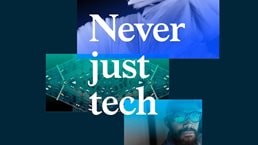In a recent McKinsey report, “The economic potential of generative AI,” our experts describe how over the decades, technology has given people “superpowers,” or abilities that go beyond human limitations.
Here at McKinsey, we’ve been exploring how generative AI might give our people such abilities, and we’re pleased to announce that we have now launched “Lilli,” our own generative AI solution for colleagues. It’s a platform that provides a streamlined, impartial search and synthesis of the firm’s vast stores of knowledge to bring our best insights, quickly and efficiently, to clients.
“Lilli aggregates our knowledge and capabilities in one place for the first time and will allow us to spend more time with clients activating those insights and recommendations and maximizing the value we can create,” says Erik Roth, a senior partner with McKinsey who leads our firm’s development of Lilli and integrating Gen AI technologies into the way we work. “An engagement team will be able to spend more time on problem solving, coaching, building capabilities, and helping clients achieve the performance they aspire to achieve.”
“Knowledge is the lifeforce of McKinsey,” explains Kitti Lakner, an associate partner and director of design for Lilli. “When we started as a firm almost 100 years ago, our knowledge was with our experts. Over the years, our experts have used it to develop playbooks, case studies, and white papers that eventually became data, digital solutions, and analytics tools such as Wave, Corporate Performance Analytics (CPA), and Periscope.”

Creating value beyond the hype
Today, our firm’s intellectual property (IP) spans more than 40 carefully curated knowledge sources; there will be more than 100,000 documents and interview transcripts containing both internal and third-party content, and a network of experts across 70 countries.
When an engagement kicks off, creating the initial project plan is an important first step. This includes searching for the most salient research documents and identifying the right experts, which can be an overwhelming task for people who are new to our firm. Even for senior colleagues, the work typically takes two weeks of researching and networking.
This is where AI “superpowers” come in.
“With Lilli, we can use technology to access and leverage our entire body of knowledge and assets to drive new levels of productivity. This is the first of many use cases that will help us reshape our firm,” explains Jacky Wright, a McKinsey senior partner and chief technology and platform officer.
For Adi Pradhan, an associate partner who specializes in technology strategy and transformations, Lilli is “a thought-sparring partner” ahead of meetings and presentations.
“I use Lilli to look for weaknesses in our argument and anticipate questions that may arise,” he says. “I also use it to tutor myself on new topics and make connections between different areas on my projects. It saves up to 20 percent of my time preparing for meetings, but more importantly, it improves the quality of my expertise and my contributions.”
Josh Sternberg, a McKinsey partner in our Life Sciences Practice, uses Lilli to answer one of the most frequently asked questions from clients: What can we learn from someone who’s done this before?
“I was looking for an example of a company that manufactures a product in a very precise way,” he recalls. “Ordinarily, I would have been thinking of other pharmaceutical examples or say, manufacturers of jet engines. Lilli came up with the example of a device used to measure paint thickness, which was unexpected but very apt.”

Generative AI: Capturing the opportunity
Before Lilli, “identifying analogues” or “comparables” could take days of chasing down the right experts. Lilli not only widens the scope of these critical initial inquiries, but also returns answers much more quickly.
“The productivity gains of Lilli are very interesting, but the ability to inspire new ways of looking at problems and answering questions is invaluable,” Sternberg points out.
So how does Lilli work? A user can type in a question and Lilli can scan our entire landscape of knowledge, identify between five to seven of most relevant pieces of content, summarize key points, include links, and even identify experts in the appropriate fields. The platform includes two modes: one for searching McKinsey's reserves of knowledge, and a second option for external sources.
The platform is named for Lillian Dombrowski, the first professional woman hired by McKinsey in 1945, who went on to become the controller and corporate secretary for the firm.
Those who knew Lillian said she was up for anything; her research led to the creation of our transportation and insurance sectors; she helped create profit-sharing and pension plans, and even started our firm’s archives. “Lilli” was selected because the platform is as nimble, flexible, and thorough as she was.
Lilli has unleashed the creative potential in our people. They are helping clients in ways we never anticipated.
Lilli was carefully designed to meet McKinsey’s technology standards using industry-leading platforms, and piloted with real users—both consultants and internal clients. “In a sense, the technology was the easy part,” says Phil Hudelson, a McKinsey partner who leads the development of our technology platforms. “The biggest challenge was to move quickly while bringing the right people to the table from functions such as legal, cyber security, risk management, and talent development to ensure that we addressed all angles so that we could make this work throughout the firm.”

The economic potential of generative AI: The next productivity frontier
The initial team of three expanded to over 70 experts. With QuantumBlack's deep experience in GenAI, including our QB Horizon suite and an ecosystem of partners, we're able to scale Lilli in a cost-effective, secure manner across thousands of colleagues by the end of the year. The effort will include upskilling users on prompt engineering, content validation, and more. We are sharing “lessons learned” through a playbook, and helping clients build their own versions of Lilli.
As an organization that develops expertise, McKinsey had the advantage of already having hundreds of people in place around the world who serve as “data stewards”: curating content, ensuring the accuracy and quality of data, sanitizing it for client confidentiality, and making it searchable and shareable across formats.
“Now we need to supercharge this capability—but at least we have the muscle to think about that in the first place,” points out Phil. “Lilli has unleashed the creative potential in our people: they are helping clients in ways we never anticipated.”
Now that is a true superpower.